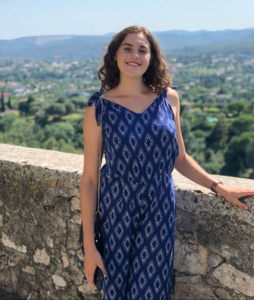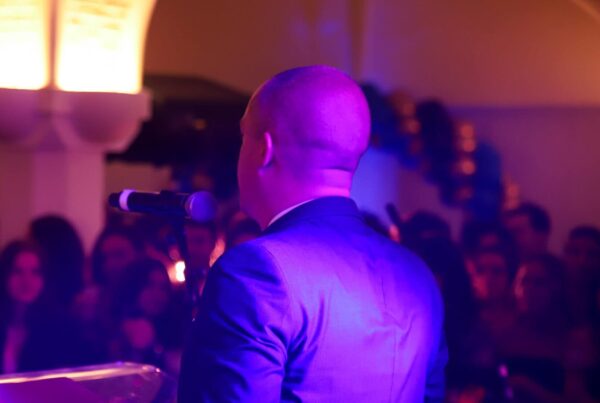The Sundial Press News team interviewed 2A students in the Euram and Euraf programs regarding their choice of major to give some insight to 1A students before they make their decision.
A total of 12 interviews were held, 6 Euram and 6 Euraf with 2 interviews conducted per major. You can also find a compilation of results from a survey sent out by the Sundial here.
EURAM INTERVIEWS
-
Economy and Society

Name: Carole-Louise Ashby
Photo by Alexandra Oh
What were your expectations going into the major? Were they met or not?
My expectations for this major were overall met, although I expected it to be more about sociology, especially in the choice of electives. The economics class in the first semester was focused on microeconomics and game theory. Looking back on it, I’m actually glad I did it because it provided me with a certain methodology and way of approaching issues that I will certainly reuse, even in political science. This semester, our major related class is not at all based on quantitative reasoning, but more on a multidisciplinary approach to business and its evolution in society.
What did you like and dislike about the major?
I think it is too focused on quantitative reasoning when it comes to electives, especially for people like me who chose the major for the sociology and macroeconomic components. However, our data-related workshop got much better this semester and our teacher is very considerate of our different levels in maths. Even if it was not fun back then, I also think that econometrics could be very useful if you want to delve more into economics or sociology in your post-grad studies. As for likes, “Sociology of Gender” was definitely my favorite class I’ve taken so far; it was really interesting and eye-opening. Overall, I do not regret my choice, although it was a bit harder than expected during the first semester.
Any advice for students choosing this major?
Definitely make sure that you’re comfortable with the quantitative side of Economics, especially for the first semester. Even if you’re not good with numbers, which is my case, you’ll still manage to get through it while learning basic concepts in Economics and discovering the Sociology of Gender! This major is a really great choice if you’re looking for a good introduction to micro/macroeconomics. And, so far the “Business and Society” course of the second semester has been really interesting and interactive.

Name: Oliver Zhang
Photo by Evan Boulogne
What were your expectations going into the major? Were they met or not?
Before I picked this major, I had heard that the major would have gender courses for Sociology which made me really excited – that’s basically the reason I picked the major. During the first semester of second year, I really liked the gender classes. I was expecting a gender knowledge course that covered the basics and I think my expectations were met. For economics, I thought it would be mostly about microeconomics and that’s what we got.
Likes and dislikes of the major?
What I like is definitely the gender classes and the economics which is really interesting since it’s about how to allocate certain goods in a society. What I don’t like about the major has to be econometrics. It’s just very hard and I didn’t have a great TA, and you have to do certain coding things with specific software that can be confusing.
Any advice for students choosing this major?
You’re making a really great choice, but beware of econometrics. My encounter with it was a bit unpleasant, but in general you’ll have a really great experience. If you’re very interested in sociology and want to know more about gender studies it’s definitely a great choice. I personally like Plantin because he has very clear slides, so if you like him, you’ll enjoy having him for another semester in economics.
-
Political Humanities

Name: Rose Jacobs
Photo by Julian Potié
What were your expectations going into the major? Were they met or not?
I was really close to taking the Politics and Government major, and I actually switched into the Political Humanities major at the last minute. I sort of came to the conclusion that I was more passionate about humanities, especially philosophy, and I wanted to use my last year to study something I was really interested in. My expectations were met completely, and I’m in love with all of my classes I take. For example I took a history class called “Narratives, Representations and Uses of the Past”, which wasn’t a traditional history class where you learn about historical events but was a class where you learn about the philosophy of history and how history is created. Classes like that give me a more intellectual base and background, which I appreciate.
What did you like and dislike about the major?
All of the main lecture courses have been great. They focus on super interesting topics, and we lucked out and got really dedicated and amazing teachers. I do think the major could improve the methodology seminars. We don’t have as many choices as the other majors and the choices can be a little repetitive or irrelevant to what we currently study. For example, I’m taking a public speaking methodology seminar, and while I think public speaking is an important skill, I fail to see how it corresponds with the goals of this major.
Any advice for students choosing this major?
First of all, if you’re even just considering or thinking about choosing Political Humanities, do it. It’s an awesome major. I think all the classes and teachers are fantastic, which is a shared sentiment with most 2As in the major with me. As for advice: you need to be able to pick and choose which readings are more important than others. You really sign up to read, analyze and think, so you learn to think and read critically and creatively rather than just memorizing so it is important to learn to prioritize readings.
 Name: Marie Kerleroux
Name: Marie Kerleroux
Photo by Evan Boulogne
What was the reality of the major like versus the expectations you had going in?
I would say that I imagined a really literary major, much more detached from current events and politics, but in reality the major shaped great ideas for me that applied to issues today. It’s much less conventional than the two other majors, but it’s still very, very interesting. I also thought it would maybe narrow down my experience at Sciences Po so I had apprehensions about that, however majors do blend during the second semester of 2A since it’s a semester that’s mostly composed of elective seminars (unlike the first one).
What did you like and dislike about the major?
The first semester was composed of two classes which were history narratives and political philosophy – both of them had a lecture and a seminar. I really, really liked the history class. It was really interesting and new because it was more like historiography than history. It shows how twisted and re-twisted these courses can be and how they can be used for your own purpose. The class was organized thematically rather than chronologically so it was actually a huge change to Piketty’s class of the first year. Although it was thematic, I wouldn’t say that it was too simplistic either, because another take-away of the class was that there’s a limit to comparison and you shouldn’t simplify history too much. About the political philosophy class, I thought that it touched upon very interesting issues, however I found it kind of dense and I had trouble maybe keeping up with the semester in this class. Overall, I would say that the strengths were the lecturers because they were really good. We also have workshops for our major during the second semester, though I find them kind of basic. We have a major class called “The Idea of Equality in the US” and it makes up for everything you don’t know. It’s really, really good background knowledge, and it just like philosophical history.
What advice would you give to someone choosing their major?
I think I’m a good person to answer that question because as I told you I had a lot of trouble making the choice, and I was hesitating between the three of them. So, I have two pieces of advice, the first one being don’t overstress the future because majors don’t close doors. I was stressed out about giving up law from the first year and also about not exploiting my high school knowledge from economics, etc. But it wasn’t the right perspective. I mean, if you’re unsure, just keep the idea of experimentation in mind. Tell yourself that 2A allows you to see what you like and don’t like, and that it’s a year that will be followed by a 3A full of choices as well during which you’ll be able – if you wish – to change your mind. The second piece of advice would be on the other side of the spectrum — don’t be unrealistic. For instance, I took a finance and trade minor, because I was nostalgic of high school economics and I thought it would be a good compromise for not choosing the economics major but in reality, I had a really hard time keeping up with the class in addition to my major. It was a lot of work, and in the end I couldn’t be involved in the two. So I would just say focus also on what you know you will succeed in.
-
Politics and Government

Name: Minna Genser
Photo by Alexandra Oh
What were your expectations going into the major? Were they met or not?
Originally, I thought I wanted to do the Political Humanities major, since I’ve always been more interested in history. In the end, I opted for Politics and Government, hoping that I’d get to study what I came here for – that being European and American politics and relations. I think the original intent got lost in translation, since we ended up studying the constitution of one European country and our Comparative Politics course was very focused on methodology. Knowing the different articles of the Fifth Republic might not always be useful for international students, but at least we get the full Sciences Po experience and the chance to understand our host country a bit better.
Likes and dislikes of the major?
Compared to last semester, when we took French Constitutional Law and Comparative Politics, I’m really happy with how this semester is organized. We have three cross-disciplinary seminars, so we get to balance our major out a bit, and our main history and international law courses make up for that. And this semester, our lecturers are much more passionate about their subjects, which is really contagious and motivating.
Any advice for students choosing this major?
To those not sure about what to do, I’d choose the major you feel the most confident about succeeding in rather than the one you are most interested in. You can always take seminars for the subjects that interest you. I think that in every major, there are always going to be aspects of it that aren’t ideal and can feel demoralizing, but I guess that’s just Sciences Po teaching us a life lesson.
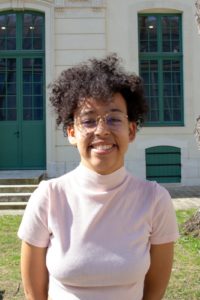
Name: Laure Ekani
Photo by Idil Kutlu
What was the reality of the major like versus the expectations you had going in?
In the first semester, I thought that we would have more law classes than we actually had. We were told that the Politics and Government major was a mixture between politics and law, and it really wasn’t. And also, I also thought that we would have less work than we have.
What did you like and dislike about the major?
I really liked Fifth Republic constitutional law. Our discussion sessions were really interesting and also the presentation subjects were really cool. Also, there was clarity about what the exams were going to be. What I disliked the most was comparative politics – the whole thing… the teacher, his accent, his manner of teaching the course, his approach to comparative politics (because even now I don’t know what comparative politics is). Even the discussion sessions were terrible and the teachers didn’t do anything about it. There was no clarity about what we had to do.
What advice would you give someone choosing their major?
An advice some people don’t think about I think, is looking – if you already know what university you want to go to next year – look up on the Sciences Po website what universities fit with your major, because some people wanted to go to some countries and they couldn’t because of their major. And also, I think It’s important to not stress too much about that because at the end of the day it’s not going to matter much for your masters degree.
EURAF INTERVIEWS
-
Economie et Société

Nom: Bastien Rébéna
Photo courtesy of Bastien
A quoi t’attendais-tu, et à quoi ressemble ta majeure en réalité?
Dû au manque d’information avant le choix des majeures, on ne pouvait pas réellement prévoir le contenu des majeurs. Mais ce choix semi-aveugle poussé par mon intérêt pour l’économie ne m’a pas déplu, bien au contraire. Je suis très content d’avoir choisi cette majeure. Le premier semestre était commun avec les Euram (NDLR : un cours de microéconomie et un de sociologie). Pour le deuxième semestre, nous n’avons malheureusement eu plus qu’un seul cours lié à la majeure et un atelier de méthode. Ce faible nombre de cours lié à la majeure est frustrant car ces cours furent parmi les plus intéressants de ma scolarité et j’aurais souhaité en avoir plus (surtout “Economics of Poverty”, dispensé uniquement aux Euraf). Je tiens à préciser que mon parcours au sein de cette majeure est principalement tourné vers l’économie et qu’il est tout aussi possible de l’orienter plus vers la sociologie mais il y aura toujours un peu des deux.
Qu’est-ce que tu aimes à propos de ta majeure, qu’est-ce qui te plaît moins?
Un des problèmes avec la majeure Économie et Société est qu’elle englobe deux matières différentes et que cela ne permet pas réellement de se spécialiser, les cours étant en plus assez généralistes (ce qui devient un léger souci quand on commence à avoir une idée de ce qu’on souhaite faire plus tard). Nous avons donc seulement 5 cours liés à la majeure sur les deux semestres.
Un des aspects positifs de la majeure est le suivi et l’aide apportée par les professeurs, étant donné que nous n’avons plus de maths alors que cela reste indispensable pour la majeure, les professeurs sont bienveillants et permettent de comprendre les cours, notamment la microéconomie. Si vous n’êtes pas une brute en mathématiques vous pouvez quand même choisir cette majeure sans soucis. De plus, la majorité des cours de cette majeure sont dispensés en anglais ce qui est un réel plus pour se préparer au départ en troisième année étant donné que – du moins pour notre promotion – nous n’avions aucun cours en anglais.
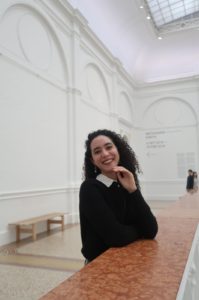
Name: Aya El Alami
What was the reality of the major like versus the expectations you had going in?
Concerning the actual subjects that were being taught, they were not completely clear when we were being presented the majors during our 1A. So, in 2A, we’re being taught topics and subjects that we’re not completely aware of. Also, in terms of the math part, it’s important to remember it’s an Economics AND Sociology major, and we tend to lose focus on the second part. So, for people who are very interested in sociology, it might be a bit unfair in that sense because you’re expecting to have as much economics as you have sociology, but in my opinion, it’s not so much the case.
What did you like and dislike about the major?
What I liked best about the courses is the fact that, especially throughout the year, (so thinking of the first semester and the second semester) there’s a good balance between theory and practice. In the first semester, we had classes on general theories in economics and in the second semester (for Eurafs) we have a course on “Economics of Poverty” which allows you to finally be able to use all the economic models and ways of thinking and theories that we were being taught in first year, and apply that to concrete examples. In this course, even though we’re speaking about poverty in general, a lot of examples are applicable to the African continent so I found that very useful. What I disliked most about the courses was in first semester it was extremely theoretical. It wasn’t very concrete. It didn’t seem like it could be applicable to real-life situations which could be a little bit frustrating when all the other classes are trying to make you become aware of the impact you could have and you think of econ as a way to really address issues and it doesn’t seem like we’re being provided with the tools to be change makers if that’s what people want to be. To me, that’s something that I disliked – it’s the big focus on theory at first, but later we had access to more concrete classes.
What advice would you give someone choosing their major?
I would honestly suggest to ask second years about what they thought but at the same time still follow your gut feeling. There’s somehow I think one of the majors that we’re interested in and not to be scared about the workload or the stereotypical views associated with the majors. A lot of people see humanities for example as having less work but it feels like less work if you’re really passionate about it. The same way some people would rather have more work in econ than less work in humanities if econ is what they’re interested in. So not be scared about the workload because, at the end of the day, the only way to handle it is to be passionate about it. So really follow what you’re passionate about, and be informed.
-
Humanités Politiques
Nom: Chiara Pinto
Photo courtesy of Chiara
A quoi t’attendais-tu, et à quoi ressemble ta majeure en réalité?
En choisissant la majeure humanités, je savais que j’allais retrouver des matières des sciences humaines. Vu que j’ai suivi une filière L au lycée, je souhaitais, après une 1A un peu mitigée, retrouver certaines matières comme la philosophie ou l’histoire. J’étais aussi très excitée par le fait que ces matières là serait revues en version Sciences Po. Je m’attendais à ce que justement ,ça me donne des clés pour comprendre le monde politique et la société aujourd’hui. En plus, il y avait la promesse de nouvelles matières comme la rhétorique !
Qu’est-ce que tu aimes à propos de ta majeure, qu’est-ce qui te plaît moins?
J’ai en général tout apprécié. Je regrette juste que ce ne soit pas plus axé sur l’Afrique mais ça c’était aussi normal du fait que les profs ne sont pas africanistes. Et puis, la majeure humanités est très éclectique et ça c’était très intéressant.
Au deuxième semestre, le tronc commun change mais par contre il y a un peu plus d’étude de la zone géo (selon le programme) et les choix des séminaires sont aussi déterminant pour ça. Enfin, comme cours, je conseillerais celui de rhétorique et African cinema au troisième semestre et “Boko Haram une menace pour l’Afrique” tout comme celui sur la traite et l’esclavage au quatrième semestre.
As-tu des conseils pour les 1As qui aimeraient choisir cette majeure?
Si je devais donner quelques conseils, je dirais qu’il faut s’investir à côté, c’est-à-dire lire et aller faire les recherches soi-même. Faire les readings parce que au final c’est eux qui sont le plus du cours. Aussi, penser aussi à ce qui nous plaît importe beaucoup à mon avis donc faire le choix en croisant centres d’intérêt et objectif professionnel. La majeure humanités, c’est beaucoup de culture générale.

Nom: Pauline Fritz
Photo courtesy of Pauline
A quoi t’attendais-tu, et à quoi ressemble ta majeure en réalité?
L’année dernière, j’ai choisi la majeure humanités politiques, principalement parce que j’avais adoré le cours de philosophie : “La violence, la pitié, la honte”. C’était la première fois que j’avais un cours de philosophie de ma vie, et j’en suis directement tombée amoureuse. Je n’étais pas fascinée par l’histoire au début, mais je ne la détestais pas non plus. Je m’attendais à faire beaucoup de philosophie et à interroger des conflits et des thèmes sociétaux avec une approche philosophique et artistique. Le fait que l’histoire est une partie principale de l’humanité m’avait échappé l’esprit. Cette année, j’ai l’impression d’avoir fait beaucoup trop d’histoire, mais je m’y suis habitué et je me suis rendu compte que l’histoire et la base de toutes analyses des phénomènes politiques.
Qu’est-ce que tu aimes à propos de ta majeure, qu’est-ce qui te plaît moins?
J’ai adoré le cours de philosophie du premier semestre. C’était une grande vue d’ensemble des grands thèmes et auteurs de la philosophie mais nous avons aussi beaucoup réfléchi sur des thématiques de l’actualité. J’avais un atelier de rhétorique comme atelier méthodologique et c’était également un grande plaisir. Le cours de politique à propos du cinéma postcolonial est génial. Si il y a encore ce cours le semestre prochain – c’est une raison pour choisir la majeure humanités. Comme je l’ai déjà dit, je ne suis pas trop passionnée par l’histoire, il faut savoir qu’il y en a beaucoup. Surtout pour le cours sur l’historiographie, j’avais un peu de mal à trouver la passion. Parfois, j’ai l’impression qu’on est un peu loin de la réalité et qu’il manque le rapport aux thèmes d’actualité. Mais finalement, c’est à vous de faire cette connexion en suivant les périodiques.
As-tu des conseils pour les 1As qui aimeraient choisir cette majeure?
Je dirais qu’en général, la majeure humanités est principalement une majeure qui t’apprend à réfléchir, à analyser et entraîner ton esprit critique. Pour vraiment profiter de cette majeure, il faut lire énormément : il est très important de faire les readings et au-delà. Il faut vraiment se lancer dans les textes et les lire avec un esprit critique. Dès que tu as l’impression que tu as accroché et que tu arrives à tirer des liens, c’est génial. Surtout avec la possibilité des mineures.
-
Politique et Gouvernement
Nom: Florian Kotimbi
A quoi t’attendais-tu, et à quoi ressemble ta majeure en réalité?
En choisissant la majeure Politique et Gouvernement, j’espérais suivre un enseignement beaucoup plus poussé sur le domaine du droit ou encore des relations internationales. Chose promise, chose due, j’ai été satisfait par les cours offerts au premier semestre.
Qu’est-ce que tu aimes à propos de ta majeure, qu’est-ce qui te plaît moins?
J’ai une mention spéciale pour le cours de Politique Comparée, qui s’est focalisée sur le continent africain, chose que nous n’avions pas eu l’année précédente.
Concernant les cours séminaires, j’ai cependant été déçu en prenant le cours d’Espace Mondial et ce en raison d’une conférence de méthode peu intéressante.
As-tu des conseils pour les 1As qui aimeraient choisir cette majeure?
Si vous aimez le droit, que vous intéressez aux relations internationales ou encore que le milieu de la politique vous attire, je vous encourage fortement à prendre cette majeure ! Beaucoup de travail vous sera demandé mais rien que vous ne puissiez pas surmonter.
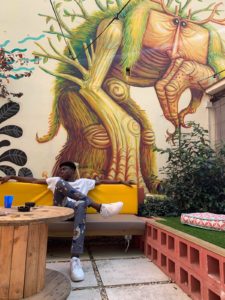
Nom: Maktoub Razaki
Photo courtesy of Maktoub
A quoi t’attendais-tu, et à quoi ressemble ta majeure en réalité?
Je m’attendais à une sorte de prolongement des cours de première année de science politique très théoriques et occidentalo-centrés mais les cours cette année suivent vraiment la concentration géographique africaine et c’est super.
Qu’est-ce que tu aimes à propos de ta majeure, qu’est-ce qui te plaît moins?
J’aime beaucoup les deux cours de politique comparée et de RI qui sont centrés sur l’Afrique, il n’y a pas vraiment quelque chose que j’aime moins. Mais je pense qu’au niveau des choix de 3A, il y a moins d’universités qui proposent cette majeur comparée à l’économie par exemple.
As-tu des conseils pour les 1As qui aimeraient choisir cette majeure?
Il ne faut surtout pas jeter les cours de 1A et être vraiment intéressé par les structures politiques africaines notamment.
Cover collage by Chloé Joubert @The Sundial Press.
Other posts that may interest you:
- The Trouble with ‘Ecocide’
- Carbon dioxide removal – hit or miss?
- Local Victories for Turkish Opposition — A Sign of Hope?
- Are France and Japan a Mismatch Made in Heaven?
- A Reflection on Dark Tourism
Discover more from The Sundial Press
Subscribe to get the latest posts sent to your email.



